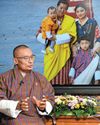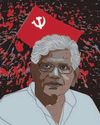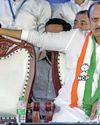
Six-year-old Bengaluru schoolgirl Jia woke up on the morning of September 7 to see Prime Minister Narendra Modi consoling ISRO chairperson K. Sivan with an embrace on television. She had learnt in school that India was going to land on the moon while she slept. Clearly, something had gone wrong. So we failed, she exclaimed. Her mother consoled her, saying the story does not have a very sad ending, and there is a thick silver lining. Most importantly, the mother realised she could not be indifferent to the subject, but should learn everything about Chandrayaan-2, because clearly, rocket science is the trending topic.
India’s second lunar probe, Chandrayaan-2, aimed to land and walk on the moon, hoping to make history by being the first country to explore its south pole and the first to manage a soft landing in its maiden attempt. One mission objective was “to surpass international aspirations”. The ambition was big, the stakes high, the probability not much in favour. The attempt failed. The earth station lost signal with the probe, Vikram, just 2.1km above its destination. It crashed very close to where it was hoped to have landed elegantly, like a cat, on four feet.
The disappointment was so crushing that the stoic chairman—who had earlier told THE WEEK that failure and success were part of the game—teared up and Modi had to stretch out his arms in that famous “jaadoo ki jhappi”, assuring both Sivan and the country that the attempt was laudable, the journey was jaandaar (robust) and shaandaar (impressive), and so what if Vikram could not control itself in the last leg but rushed to meet the moon.
Sivan recovered enough composure by evening to announce that the mission was 95 per cent successful. The orbiter, with eight payloads, was working well and could outlive its mission life of a year by another six, given its fuel reserves.
This story is from the September 22, 2019 edition of THE WEEK.
Start your 7-day Magzter GOLD free trial to access thousands of curated premium stories, and 9,000+ magazines and newspapers.
Already a subscriber ? Sign In
This story is from the September 22, 2019 edition of THE WEEK.
Start your 7-day Magzter GOLD free trial to access thousands of curated premium stories, and 9,000+ magazines and newspapers.
Already a subscriber? Sign In

A golden girl
One of India's most formidable beauties passed away earlier this month. The odd thing is she would absolutely hate this obituary; she hated being written about and avoided publicity for all of her nine decades. Indira Aswani was 93 when she died. But anyone who encountered her, even briefly, was in such awe of her grace and poise, and one could not but remember her forever.

The interest in wine is growing delightfully in India
The renowned British wine writer and television presenter Jancis Robinson, 74, recently came to Delhi and Mumbai to reacquaint herself with India's wine industry. This was the Robinson's fourth visit to India; the last one was seven years ago. On this trip, Robinson and her husband, restaurateur Nicholas Lander, were hosted by the Taj Hotels and Sonal Holland, India's only Master of Wine.

United in the states
Indian-Americans coming together under the Democratic umbrella could get Harris over the line in key battlegrounds

COVER DRIVE
Usage-driven motor insurance policies offer several benefits

GDP as the only measure of progress is illogical
Dasho Karma Ura, one of the world's leading happiness experts, has guided Bhutan's unique gross national happiness (GNH) project. He uses empirical data to show that money cannot buy happiness in all circumstances, rather it is family and health that have the strongest positive effect on happiness. Excerpts from an interview:

India is not a controlling big brother
Prime Minister Tshering Tobgay considers India a benevolent elder sibling as the \"big brotherly attitude\" is happily missing from bilateral ties. He thinks the relationship shared by the two countries has become a model of friendship not just for the region, but for the entire world. \"India's attitude is definitely not of a big brother who is controlling and does not allow the little brother to blossom and grow,\" says Tobgay in an exclusive interview with THE WEEK.

Comrade with no foes
Lal Salaam, Comrade Yechury-you were quite a guy!

Pinning down saffron
In her first political bout, Vinesh Phogat rides on the anti-BJP sentiment across Haryana

MAKE IN MANIPUR
Home-made rockets and weapons from across the border are escalating the conflict

SAHEB LOSES STEAM
Coalition dynamics and poor electoral prospects continue to diminish Ajit Pawar's political stock